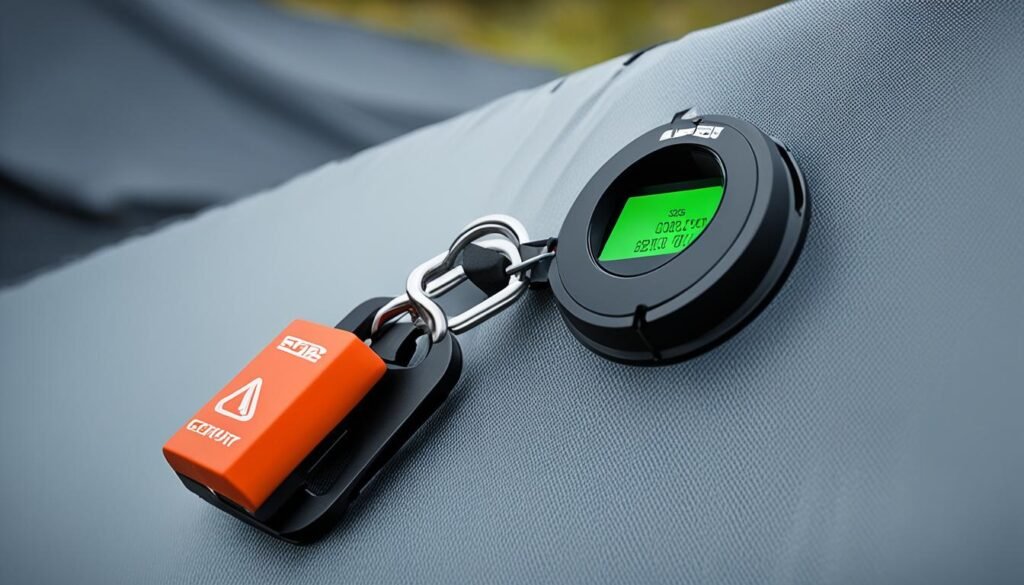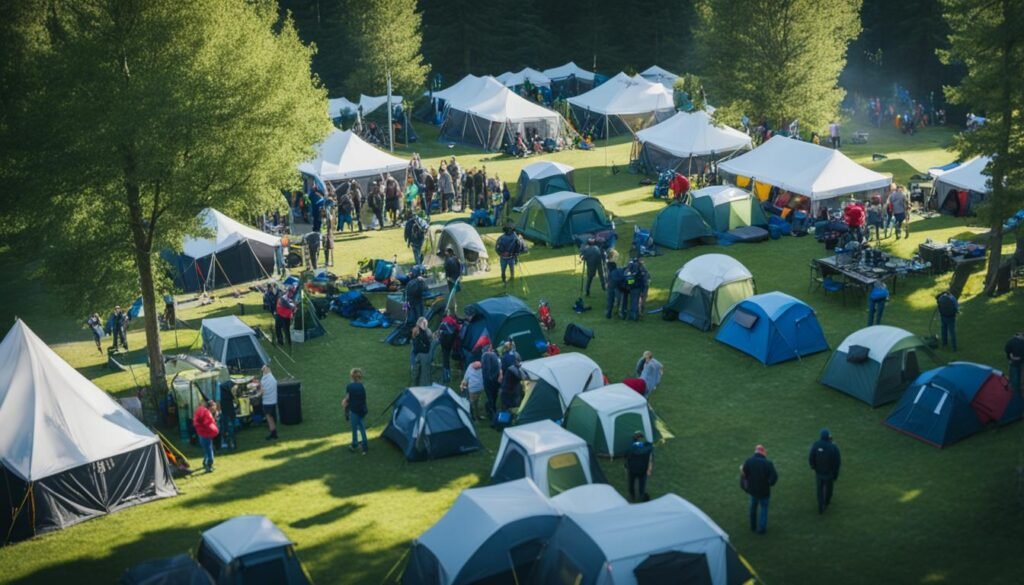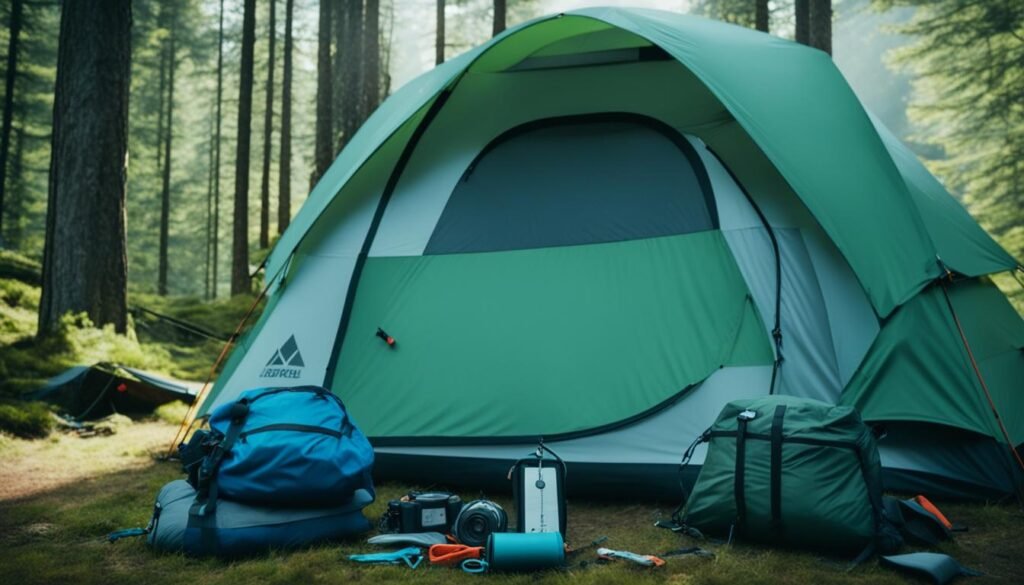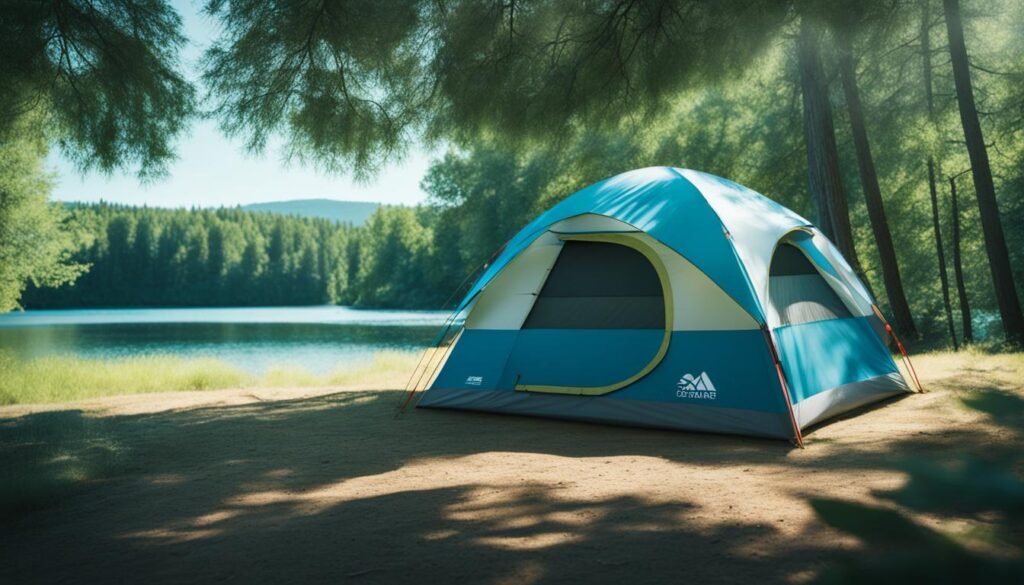When camping in a tent, it’s crucial to prioritize the security of your belongings and your own safety. Locking your tent securely not only deters potential thieves but also provides peace of mind, allowing you to fully enjoy your camping experience. In this article, I will guide you through various methods of securing your tent, share tips for choosing a secure campsite location, and provide strategies to protect your valuable items. By implementing these tent security measures, you can ensure a worry-free camping trip.
Key Takeaways:
- Secure your tent to prevent theft and enhance your camping experience.
- Choose a campsite with security measures in place, such as gated entrances or surveillance cameras.
- Lock your tent using padlocks, cable locks, or combination locks.
- Consider alternative methods like zip ties or knots if physical locks are unavailable.
- Utilize technological solutions such as smart locks or motion-activated lights for added security.
Understanding the Need for Tent Security
Before delving into the specifics of how to lock a tent, it’s crucial to comprehend why tent security is of utmost importance. While camping is an exciting and enjoyable activity, it also exposes you to potential security threats, such as theft, which can quickly spoil your experience. By taking proactive measures to secure your tent, you not only deter thieves but also safeguard your belongings. This section will emphasize the significance of tent security, shedding light on the potential risks associated with leaving your tent unsecured.
Choosing a Secure Campsite Location
When it comes to ensuring tent security, one of the most important factors to consider is the campsite location you choose. Opting for a secure campsite can significantly reduce the risk of theft and enhance your overall safety during your camping trip. Here are some tips to help you select a secure campsite and enjoy a worry-free camping experience.
1. Research Potential Campsites
Before finalizing your campsite choice, take the time to research potential options. Look for campsites that prioritize security by providing features such as gated entrances, surveillance cameras, and designated park rangers or campsite owners who oversee the area. These additional security measures can act as a deterrent to potential thieves.
2. Consider Crowded Campsites
Choosing a campsite with a higher number of campers can contribute to a safer environment. Crowded campsites create a sense of community and encourage campers to look out for one another. Friendly neighbors can provide an extra layer of security by keeping an eye on your tent and belongings when you’re away.
3. Check Online Reviews and Recommendations
Before making a reservation, read online reviews and seek recommendations from fellow campers. Their experiences can offer valuable insights into the security measures and overall safety of different campsites. Look for positive reviews that specifically mention the campsite’s security features and friendly camping community.
4. Prioritize Well-Lit Areas
Opt for campsites with good lighting, both around the general area and within the campground itself. Well-lit areas help deter potential thieves by minimizing hiding spots and increasing visibility. Look for campsites that provide sufficient lighting during nighttime hours.
5. Verify Emergency Services Accessibility
Ensure that the campsite you choose has proximity to emergency services such as police stations, hospitals, or fire stations. Having quick access to these services can be crucial in case of any security or medical emergencies. It’s essential to prioritize your safety and have peace of mind throughout your camping trip.
6. Consider Reserved Campsites
Reserved campsites, especially those located within national parks or managed by reputable organizations, often implement stricter security measures. These campsites may require campers to provide identification and proof of reservation, contributing to a more secure camping environment.
7. Look for Park Ranger Presence
Park rangers play a vital role in ensuring the safety of campers and maintaining the security of the campsite. Campgrounds with regular park ranger patrols can help deter potential thieves and provide immediate assistance in case of any security concerns or emergencies.
Remember, choosing a secure campsite location is an essential step in protecting your tent and belongings. By following these tips and conducting thorough research, you can make an informed decision and enjoy a safe and secure camping experience.
Storing Valuables While Camping
When camping, it’s important to properly store your valuables to prevent theft. By following best practices and taking necessary precautions, you can secure your belongings and enjoy your camping trip without worries.
Limit the Number of Valuables
One effective way to protect your valuables while camping is to limit the number of items you bring that are of significant value. Consider only bringing the essentials and leaving expensive or sentimental items at home. This minimizes the risk of loss or theft and allows you to focus on the experience.
Store Valuables in a Locked Car or Communal Area
If possible, storing valuables in a locked car or communal area is an ideal option. This adds an extra layer of security, especially if the car or area is monitored or guarded. Utilize car locks, trunk space, or secure storage facilities provided by the campsite to keep your belongings safe.
Avoid Obvious Hiding Places Within Your Tent
While your tent can provide some level of security, it’s important to avoid obvious hiding places for valuables within it. Thieves may quickly search common areas, such as under sleeping bags or in easily accessible pockets. Instead, consider using creative hiding spots or utilizing personal lockboxes or travel safes to keep your valuables secure.
Useful Tips:
- Keep your valuables organized and hidden from view.
- Consider using a portable safe or lockbox for added security.
- Never leave valuable items unattended at your campsite.
- When leaving your campsite, either take your valuables with you or secure them in a locked area.
- Be cautious when sharing information about valuable items with others at the campsite.
By following these tips and being mindful of your valuables, you can greatly reduce the risk of theft while camping. Securely storing your belongings allows you to relax and fully enjoy your outdoor adventure without any unnecessary concerns.
Meeting the Campsite Owners
When it comes to ensuring the security of your camping experience, it’s essential to go beyond locking your tent and explore additional measures that can enhance your safety. One effective strategy is to interact with the owners or managers of the campsite. Not only can they provide valuable information about the security measures in place, but they can also offer assistance in case of any unforeseen situations.
Building relationships with campsite owners has several benefits:
- Enhanced Security: Campsite owners are well-informed about the safety protocols and measures implemented in their facility. By interacting with them, you can gain valuable insights into the existing security arrangements and any specific challenges related to the campsite’s location. This knowledge can help you take additional precautions and ensure a secure camping experience.
- Assistance and Support: In case of emergencies or unexpected incidents, knowing the campsite owners can provide you with a sense of security. They are often available to offer assistance or guidance during challenging situations. Whether it’s contacting authorities, providing assistance with repairs, or addressing any concerns, campsite owners can be a valuable resource when you need support during your camping trip.
- Local Knowledge: Campsite owners are usually familiar with the surrounding area and can provide insights into nearby attractions, hiking trails, or other outdoor activities. By establishing a friendly rapport with them, you can gain access to insider information about the best spots to explore, enhancing your overall camping experience.
Interacting with campsite owners not only enhances the security aspect of your camping trip but also allows you to form connections within the camping community. So, take the initiative to introduce yourself, ask questions about the facilities, and build a friendly relationship with the campsite owners. You’ll not only feel more secure but also create lasting memories and connections during your camping adventures.
“Building relationships with campsite owners can provide an additional layer of security, assistance in case of emergencies, and insights into the local area. Take the time to introduce yourself and build connections that enhance your camping experience.”
| Benefits of Knowing Campsite Owners |
|---|
| Enhanced Security |
| Assistance and Support |
| Local Knowledge |
How to Lock a Tent
Locking your tent is a crucial step in ensuring its security and deterring potential thieves. By using reliable tent locks, you can have peace of mind knowing that your belongings are protected while you enjoy your camping adventure. In this section, we will explore different tent lock options and provide step-by-step instructions on how to properly lock your tent using these various locking mechanisms.
Types of Tent Locks
There are several types of tent locks available, each offering unique features and levels of security. Here are three common options:
- Padlocks: Padlocks are versatile and come in various sizes and strengths. Choose a padlock with a hardened shackle to resist cutting or break-in attempts.
- Cable locks: Cable locks consist of a flexible cable with a lock mechanism. These locks are convenient for securing zippers, tent doors, or attaching your tent to a fixed object.
- Combination locks: Combination locks offer keyless security and are easy to use. Set a unique combination and keep it private to ensure maximum security for your tent.
Each lock type has its advantages, so consider your specific needs and camping environment when choosing the right lock for your tent.
Steps to Lock Your Tent
- Identify the appropriate attachment points on your tent, such as zippers, door handles, or loops.
- Place the shackle or cable of your chosen lock through the attachment points, ensuring a secure fit.
- If using a padlock, insert the shackle into the lock body and secure it. For combination locks, set your desired combination, ensuring it is not easily guessed.
- Test the lock to ensure it is properly secured and cannot be easily tampered with or removed.
By following these simple steps, you can effectively lock your tent and significantly reduce the risk of theft or unauthorized access. Remember to choose high-quality, durable locks that are specifically designed for outdoor use.
Alternatives to Physical Locks
While physical locks are a popular choice for securing tents, there are alternative methods that can be just as effective. These alternatives provide additional options for securing your tent if you don’t have access to locks or prefer non-locking methods.
1. Zip Ties
Zip ties are a versatile and inexpensive alternative to traditional locks. They can be used to secure tent zippers or tie down tent flaps, preventing easy access to your belongings. Simply thread the zip tie through the zipper pulls or tent loops and tighten it securely.
2. Shoelaces
If you have spare shoelaces, they can be used to secure your tent opening. Lace the shoelaces through the zipper pulls or tent loops, and tie them tightly to prevent unauthorized entry. This method is quick, easy, and doesn’t require any additional equipment.
3. Knots
Knots can be an effective way to secure tent openings without locks. There are various knot techniques you can use, such as the bowline knot or the square knot, to keep your tent securely closed. Ensure that the knots are tight and not easily untied to enhance tent security.
4. Belts
If you have spare belts, they can serve as makeshift locks for your tent. Wrap the belt around the tent opening and secure it tightly. This method provides a visible deterrent and can make it more difficult for potential thieves to gain access to your tent.
By utilizing these alternatives to physical locks, you can effectively secure your tent and protect your belongings while camping. Choose the method that works best for your needs and ensures the safety of your camping gear.
Technological Solutions for Tent Security
When it comes to securing your tent, technology can offer advanced solutions that provide enhanced safety and peace of mind. With the advancement of smart devices and innovative gadgets, there are various options to explore for tent security.
Smart Locks for Tents
One of the technological advancements in tent security is the availability of smart locks designed specifically for tents. These locks utilize electronic systems, allowing you to lock and unlock your tent using a smartphone or a specific access code. Smart locks eliminate the need for physical keys and provide an extra layer of convenience and security.
Tent Security Alarms
Tent security alarms are another valuable technological solution to consider. These alarms are designed to detect any unauthorized entry or movement inside your tent. When triggered, they emit a loud sound, alerting you and potentially scaring off potential intruders. Tent security alarms can be easily activated and are an effective deterrent against theft and unauthorized access.
Motion-Activated Lights for Tent Security
Motion-activated lights are an excellent addition to your tent security setup. These lights use advanced motion-sensing technology to automatically turn on when they detect movement in the surrounding area. By illuminating the area around your tent, motion-activated lights discourage unauthorized access and provide increased visibility during nighttime.
To enhance your understanding of the technological solutions available for tent security, below is a table summarizing the key features of smart locks, tent security alarms, and motion-activated lights:
| Technological Solution | Key Features |
|---|---|
| Smart Locks for Tents | – Electronic locking system – Smartphone or access code control – No physical keys required – Convenient and secure |
| Tent Security Alarms | – Detect unauthorized entry – Emit loud sound when triggered – Effective deterrent – Easy to activate |
| Motion-Activated Lights | – Automatically turn on with movement – Discourage unauthorized access – Improve nighttime visibility – Enhance overall tent security |
By incorporating these technological solutions into your tent security measures, you can significantly enhance the safety of your camping experience. Whether it’s the convenience of smart locks, the deterrence provided by tent security alarms, or the added visibility of motion-activated lights, these advancements in technology offer practical and effective ways to protect your tent and belongings.

Importance of Campsite Selection for Security
When it comes to camping, choosing the right campsite is essential for ensuring your safety and security. Selecting a secure campsite location can significantly reduce the risk of theft and provide peace of mind during your outdoor adventure. In this section, I will highlight the importance of campsite selection for security and provide valuable tips for choosing a location that offers adequate security measures.
When evaluating potential campsite options, consider the following factors:
- Lighting: Opt for campsites that are well-lit, both around the general area and within the campsite itself. Adequate lighting discourages unwanted visitors and makes it easier to identify any suspicious activity.
- Visibility: Look for campsites that provide good visibility, both from the surrounding areas and from neighboring campsites. A visible and open environment can help deter potential thieves and create a sense of community vigilance.
- Presence of Staff or Security Personnel: Choose campsites that have a presence of campsite staff or security personnel. Their presence adds an extra layer of security and provides assistance in case of emergency situations.
By considering these factors, you can make informed decisions and select a campsite that prioritizes security. Remember, the security of your personal belongings and the peace of mind are crucial elements for a successful camping experience.
Choosing a secure campsite location is like laying a foundation of trust and peace of mind for your camping adventure.
Table: Campsite Selection Criteria for Security
| Factors | Description |
|---|---|
| Lighting | Opt for well-lit campsites to deter theft and enhance visibility at night. |
| Visibility | Select campsites with good visibility to create a sense of community vigilance and discourage unwanted visitors. |
| Presence of Staff or Security Personnel | Choose campsites with a presence of campsite staff or security personnel for added security and assistance during emergencies. |
By carefully considering these campsite selection criteria, you can choose a campsite that prioritizes your security and allows you to enjoy a worry-free camping experience.
Choosing a secure campsite location is crucial for ensuring your safety and the security of your belongings while camping. The right campsite can make a significant difference in your overall camping experience. In the next section, we will discuss the best practices for storing valuables while camping, further enhancing your security measures.
Protecting Your Tent from Animals
While camping, one of the potential risks to your tent and belongings is animal intrusion. Animals can be attracted to the smell of food or be curious about your camping gear, which may lead them to your tent. To prevent animals from entering your tent and causing damage, it’s important to take certain precautions and secure your camping area properly.
Proper Food Storage
One of the main attractions for animals is food. To keep animals away from your tent, make sure to store all food items securely. Use airtight containers or sealable bags to prevent the scent of food from spreading. If possible, store your food in a separate area, such as a bear-proof canister or designated food storage locker provided by the campground. This will significantly reduce the chances of attracting animals to your tent.
Clean Campsite
Keeping a clean campsite is another effective way to deter animals from approaching your tent. Animals are often attracted by the smell of food scraps or garbage. Be sure to properly dispose of any leftovers or food waste in designated trash containers. Additionally, clean up any spilled food or drinks around your campsite to eliminate potential attractants for animals.
Securing Your Tent
To avoid animals damaging or entering your tent, it’s essential to properly secure it. Start by removing any food, snacks, or scented items from your tent that might attract animals. Be mindful of strong odors, such as toothpaste or perfumes, which may also attract animals. Additionally, consider using camping gear specifically designed to prevent animal intrusion, such as animal deterrent sprays or mesh netting to cover tent openings.
Remember that preventing animal intrusion not only safeguards your tent and belongings but also ensures the safety of both you and the animals. Respecting wildlife and their habitats is crucial for a harmonious camping experience.
By following these tips and strategies, you can reduce the risk of animals entering your tent and protect your belongings from potential damage. Remember to always be aware of your surroundings and adhere to any specific guidelines or regulations set by the campground or park authorities regarding wildlife interactions.
| Tips for Protecting Your Tent from Animals |
|---|
| Store food securely in airtight containers or designated food storage lockers |
| Keep your campsite clean by properly disposing of food waste |
| Remove any food or scented items from your tent |
| Consider using animal deterrent sprays or mesh netting to secure tent openings |
Remember, protecting your tent from animals is not only about safeguarding your belongings but also ensuring the well-being of the wildlife inhabiting the camping area.
Top Six Tips for Tent Security at Festivals
Securing your tent at festivals is crucial to protect your belongings from theft, considering the large crowds that gather at these events. To ensure the security of your tent and have peace of mind during festival camping, follow these six essential tips:
- Introduce yourself to neighbors: Building rapport with your camping neighbors creates a sense of community and increases vigilance. Knowing and communicating with nearby campers can help deter thieves.
- Pitch in crowded areas: Setting up your tent in crowded areas can act as a deterrent to potential thieves, as they are less likely to target tents in heavily populated sections.
- Avoid visible padlocks: While a padlock may seem like a straightforward method of securing your tent, it can inadvertently signal the presence of valuable items inside. Instead, consider alternative locking methods that are less conspicuous.
- Hide valuables while sleeping: Keeping your valuables out of sight during sleep is essential. Store them in a hidden pocket within your sleeping bag or place them in a secure locker provided by the festival, if available.
- Use personal identification marks: Customize your tent or camping gear with distinctive markings or colors to make it easily recognizable and discourage thieves from targeting it.
- Keep your tent tidy: A neat and organized tent creates the illusion of a well-secured space. Thieves are less likely to target a tent that appears well-maintained and lacks easy access.
Implementing these tips will significantly enhance the security of your tent and minimize the risk of theft during festival camping.
Remember, securing your personal belongings and your tent at festivals is essential to ensure a safe and enjoyable experience.
Image:

Securing Your Tent on the Beach
Camping on the beach offers a unique and picturesque experience, but it also requires specific security measures to ensure the safety of your tent. With the sand and wind as potential challenges, it’s essential to take steps to secure your tent effectively. Here are some valuable tips and strategies to protect your tent from the elements and potential theft:
- Use beach stakes: Invest in specialized beach stakes that are designed to anchor your tent securely in the sand. These stakes have a wider surface area and better stability, making them ideal for beach camping.
- Bury the tent legs in the sand: Dig shallow holes in the sand, and bury the legs of your tent to provide additional stability. This technique helps prevent your tent from getting blown away by strong winds.
- Utilize sandbags: Place sandbags or heavy objects inside your tent, positioned strategically to provide extra weight and stability. This will help prevent your tent from shifting or collapsing in windy conditions.
- Utilize guy ropes: Attach guy ropes to the corners and sides of your tent, and anchor them securely to stakes or heavy objects buried in the sand. Guy ropes are effective in preventing your tent from swaying or collapsing in gusty winds.
By implementing these beach tent security tips, you can enjoy a peaceful and worry-free camping experience on the beach. The proper measures will protect your tent from the sand and wind, ensuring a comfortable stay.
Note: Make sure to check the local regulations and guidelines for tent placement on the specific beach you plan to camp on. Some beaches may have restrictions or guidelines in place to protect the environment and ensure the safety of campers.
Remember, securing your tent on the beach goes beyond protecting your belongings; it also keeps the environment safe. Be mindful of the beach’s rules and leave no trace when you pack up your campsite. Enjoy the natural beauty and tranquility of the beach while respecting its unique ecosystem.
Securing Your Tent in Sand
Pitching a tent in sandy terrain can present unique challenges when it comes to tent security. Sand, with its loose and shifting nature, makes it difficult to anchor a tent securely and prevent movement. However, by implementing the right strategies, you can ensure that your tent remains stable and protected in sandy environments.
Selecting the Right Area:
Choosing the right area for pitching your tent is crucial when dealing with sand. Look for a spot that has compacted sand or a slight depression where the sand is denser. Avoid areas with loose, powdery sand as it will not provide a solid base for securing your tent.
Using Sand Anchors:
One effective method for securing your tent in sand is by using sand anchors. These are specially designed devices that you can bury in the sand, providing stability and preventing your tent from moving. They typically feature a spiral shape or a wide surface area to maximize grip in the sand.
An alternative method is to use natural elements like trees or rocks to secure your tent. If there are nearby trees or large rocks, you can tie the guy ropes or tent corners to them to prevent movement. Make sure the anchoring points are sturdy and won’t be easily uprooted or dislodged.
Making Your Own Sandbags:
If you don’t have access to sand anchors or suitable natural elements, you can make your own sandbags to anchor your tent. Fill small bags or pouches with sand and bury them near the tent corners or along the guy ropes. Sandbags provide weight and stability, preventing your tent from being easily blown away by strong winds or shifting sand.
By employing these strategies, you can enhance the security of your tent in sandy terrain and minimize the risk of movement or damage. Remember to always consider the unique conditions of the sand and adapt your anchoring methods accordingly.
Conclusion
In conclusion, ensuring tent security is vital for a safe and enjoyable camping experience. By implementing the tips and strategies outlined in this article, you can effectively protect your tent and belongings from theft, choose secure campsite locations, and prevent animal intrusion. Taking these precautions will provide you with peace of mind, allowing you to fully embrace the beauty of the outdoors.
Remember to lock your tent using appropriate locks, such as padlocks or combination locks, and store your valuables in a secure location, such as a locked car or communal area. Additionally, familiarize yourself with the campsite owners or managers, as they can provide valuable insights and assistance regarding security measures.
Whether you are camping at a crowded campsite, attending a festival, or enjoying the beach, prioritizing tent security is crucial. By following these guidelines, you can safeguard your tent and belongings, ensuring a memorable and worry-free camping adventure. So go ahead, explore the great outdoors and create lasting memories!
FAQ
Why is tent security important while camping?
Tent security is important to deter potential thieves and protect your belongings from theft. By securing your tent, you can enjoy a worry-free camping experience.
How do I choose a secure campsite location?
When choosing a campsite, look for locations with security measures such as gated entrances, surveillance cameras, and the presence of park rangers or campsite owners. Opt for crowded campsites with friendly neighbors for added security.
How can I store my valuables to prevent theft while camping?
It is recommended to limit the number of valuables you bring and store them in a locked car or communal area. Avoid obvious hiding places within your tent and keep your valuables out of sight.
Is it beneficial to interact with the campsite owners?
Yes, introducing yourself to the campsite owners and building a friendly relationship can provide an additional layer of security. They can offer information about the security measures in place and assist you if needed.
What are the different types of tent locks I can use?
You can use padlocks, cable locks, or combination locks to secure your tent. These locks are effective in deterring potential thieves from entering your tent.
Are there alternatives to physical tent locks?
Yes, you can use zip ties, shoelaces, knots, or belts to secure tent openings if you don’t have access to locks or prefer non-locking methods.
Are there technological solutions for tent security?
Yes, you can utilize smart locks, tent security alarms, and motion-activated lights for enhanced tent security. These technological solutions provide advanced options for securing your tent.
How does campsite selection impact tent security?
Choosing a secure campsite with good lighting, visibility, and the presence of campsite staff or security personnel can significantly enhance tent security.
How can I prevent animals from entering my tent?
Proper food storage and keeping a clean campsite can help prevent animal intrusion. Additionally, securing your tent with proper closures and keeping the tent clean can deter animals from entering.
What are the top tips for securing a tent at festivals?
The top tips for securing a tent at festivals include introducing yourself to neighbors, pitching your tent in crowded areas, avoiding visible padlocks, and hiding valuables while sleeping.
How do I secure my tent on the beach?
You can secure your tent on the beach by using beach stakes, burying the tent legs in the sand, using sandbags for added stability, and utilizing guy ropes to secure it against the wind.
How can I secure my tent in sand?
To secure a tent in sand, select the right area, use sand anchors or stakes, tie the tent to a tree or rocks, and make your own sandbags as anchors to prevent tent movement.







